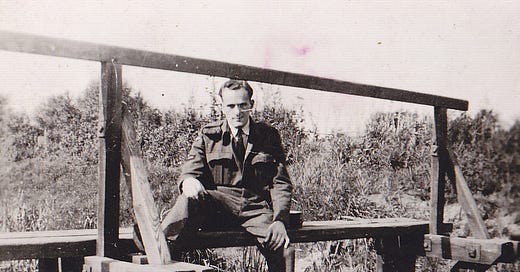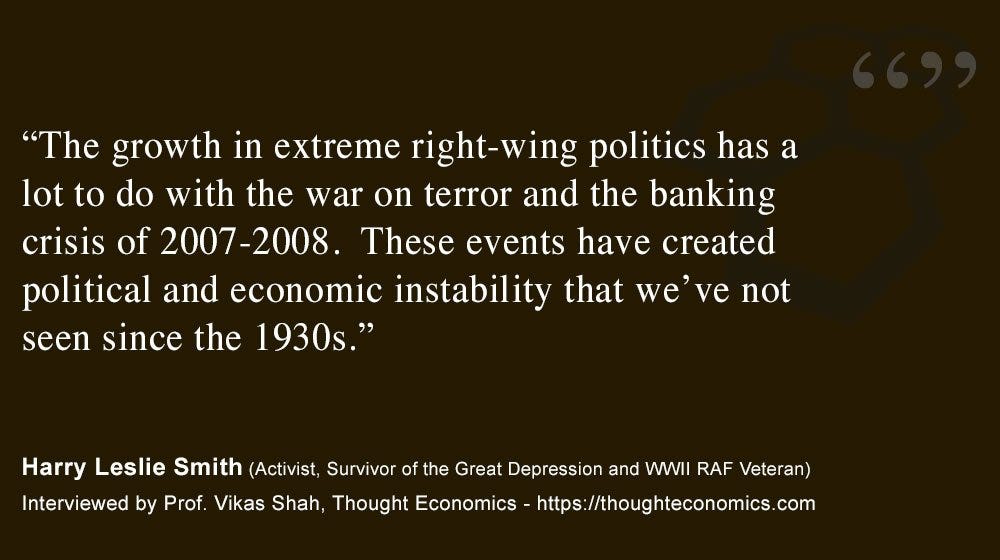"I wasn't convinced dying for the King in this war was the purpose of my existence."
The Green & Pleasant Land is an important read, considering the juncture we find ourselves politically and economically.
All the excerpts from Harry Leslie Smith's last work, which remained unfinished when he died- are being navigated to a subfolder titled The Green And Pleasant Land.
It will be easier for readers to find the progression of the last book Harry Leslie Smith worked on before his death in November 2018. I have been editing and shaping it to how my Dad wanted it presented to his readers. Chapters 1-31 are located in that subfolder- and are not behind a paywall. More will follow over the next few weeks.
Society is broken. Democracy does not function as it was intended. It works for the select entitled few. It can't be repaired unless we rebuild a Welfare State fit for the 21st century.
Democracy won't survive neoliberalism, and should we continue on this path- most of us will envy the dead.
It might even be too late to stop our march to authoritarianism. But it is still worth the effort to resist.
If you are financially able to move from a free to a paid subscription and feel it is worth it-please do because it keeps the project running and me housed. I have also included a Tip Jar for those who feel inclined. But again no pressure, it is for those who can.
The Green And Pleasant Land
Chapter Thirty-One
St. Athan, Wales, Spring 1941
The train journey from Padgate to St Athan in Wales began optimistically in the morning, but it didn't last. An irritable weariness overtook us as the hours trundled towards nightfall.
The jokes stopped, and the gripping began when dusk fell- and the blackout curtains were drawn across the windows of the train carriages.
After eighteen hours, our train arrived at Cardiff. The train doors were opened, and we spilt out with the force and sloppiness of water tossed from the bucket of a washerwoman.
On the darkened platform, there was confusion and shouts from NCOs. "Put that bloody cigarette out. There is a blackout in effect.”
With a kit bag slung on my back, I jumped onto a lorry that took me to RAF St Athan, forty minutes away.
It was the Air Force's best training base for signals, wireless operators, bomb aimers, navigators, and other journeymen who wanted to be in the business of modern warfare. RAF St. Athan was enormous and sprawled across- a vast tract of land as if it were its own municipality whose only industry was war.
Once inside RAF St Athan, we presented our travel documents and assignment orders. Being moved about like a snooker ball irritated Robbie, but it left me unimpressed. I had been banged around and made midnight dashes all through my youth. As a kid, I left many doss houses through the back window or front door in confusion and haste.
At least in the RAF, I knew there was always food and a bed waiting for me.
The mess hut was four times the size of Padgate. The menu was identical; plentiful food rich in meat, spuds, and watery tea. But it tasted good as we had not eaten since leaving Lancashire.
After I ate, I felt sated. The war, so far, was a piece of cake for me. For others, it wasn't. Europe was a charnel house. In Poland during the spring of 1941; intellectuals, Jews, and communists were butchered in a camp called Belzec. They were shot before enormous open pits where their corpses fell with calculated precision as if they were match sticks being tossed into an ashtray.
In the morning, I awoke to the barking from a sergeant who bitterly antagonized us to rise from our dark slumbers and make ourselves presentable.
There was no mucking about at St Athan's because Britain was still alone in its war against Hitler.
The RAF was thrashed in the air that year by the Luftwaffe and on the ground Nazi anti-aircraft batteries across the occupied continent.
Bomber Command squadrons took off from airfields all across England and returned in battered formation, their flock thinned and damaged. Death outweighed survival in 1941 for Britain's young who took to the air to defend its islands. Even on the first day at St Athan's, warrant officers encouraged- us new recruits to consider rear gunnery training for active service rather than Morse code signal instructions.
Some took them up right away. But I wasn't convinced dying for the King in this war was the reason for my existence.
Wireless training began on my first day at RAF St Athan.
The instructor was a cynical chain smoker who spoke in precise sentences. He didn't suffer fools or those who were idle in his classroom. We were to learn our new vocation as quickly as possible. So we could get on with our true purpose, fighting the war.
Your subscriptions are so important to my personal survival because like so many others who struggle to keep afloat, my survival is a precarious daily undertaking. The fight to keep going was made worse- thanks to getting cancer along with lung disease and other co- morbidities which makes life more difficult to combat in these cost of living crisis times. So if you can join with a paid subscription which is just 3.50 a month or a yearly subscription or a gift subscription. I promise the content is good, relevant and thoughtful. But if you can’t it all good too because I appreciate we are in the same boat. Take Care, John




